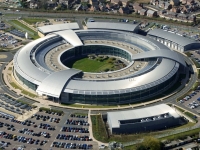Technology
Developing the Cyber Experts of the future
GCHQ certifies Masters Degrees

GCHQ (Source: © Crown Copyright)
USPA NEWS -
Developing the Cyber Experts of the future - GCHQ certifies Master's Degrees in Cyber Security - The certification of six Master´s degrees in Cyber Security was announced by Rt.Hon Francis Maude, Minister for the Cabinet Office, when he visited GCHQ.
This marks another significant step in the development of the UK´s knowledge, skills and capability in all fields of Cyber Security as part of the National Cyber Security Programme. The National Cyber Security Strategy recognises education as key to the development of Cyber Security skills and, earlier in the year, UK universities were invited to submit their Cyber Security Master´s degrees for certification against GCHQ´s stringent criteria for a broad foundation in Cyber Security. Partnerships have been key throughout the process with the assessment of applicants based on the expert views of industry, academia, professional bodies, GCHQ and other government departments.
The six successful Master´s degrees were judged to provide well-defined and appropriate content, delivered to the highest standard. The development of GCHQ-certified Master´s degrees will help the successful universities to promote the quality of their courses and assist prospective students to make better informed choices when looking for a highly valued qualification. It will also assist employers to differentiate between candidates when employing Cyber Security staff.
A further call for Master´s certification will take place in late 2014 and will be extended to degrees which are focused on critical areas of Cyber Security such as digital forensics. The six successful universities, whose Cyber Security Master´s degrees have been awarded GCHQ-certified status, are:
Full certified status:
Edinburgh Napier University - Degree - MSc in Advanced Security and Digital Forensics
Lancaster University - Degree - MSc in Cyber Security
University of Oxford - Degree - MSc in Software and Systems Security
Royal Holloway, University of London - Degree - MSc in Information Security
Full certified status:
Edinburgh Napier University - Degree - MSc in Advanced Security and Digital Forensics
Lancaster University - Degree - MSc in Cyber Security
University of Oxford - Degree - MSc in Software and Systems Security
Royal Holloway, University of London - Degree - MSc in Information Security
Provisional certified status:
Cranfield University - Degree - MSc in Cyber Defence and Information Assurance
University of Surrey - Degree - MSc in Information Security
Francis Maude, Minister for the Cabinet Office said:
'Every time I visit GCHQ I see first-hand their tremendous work on Cyber Security. Cyber Security is a crucial part of this government's long term plan for the British economy. We want to make the UK one of the safest places in the world to do business online. Through the excellent work of GCHQ, in partnership with other government departments, the private sector and academia, we are able to counter threats and ensure together we are stronger and more aware.'
Cranfield University - Degree - MSc in Cyber Defence and Information Assurance
University of Surrey - Degree - MSc in Information Security
Francis Maude, Minister for the Cabinet Office said:
'Every time I visit GCHQ I see first-hand their tremendous work on Cyber Security. Cyber Security is a crucial part of this government's long term plan for the British economy. We want to make the UK one of the safest places in the world to do business online. Through the excellent work of GCHQ, in partnership with other government departments, the private sector and academia, we are able to counter threats and ensure together we are stronger and more aware.'
Nigel Smart, Professor of Cryptology, University of Bristol said:
'I am delighted to have been appointed as Independent Chair of the panel that assessed applications and am excited that GCHQ has introduced this rigorous standard for judging general Cyber Security Master's Degrees.
'For the first time, UK universities which become certified will have a means to promote the quality of the Cyber Security they teach. Over the next few years, as GCHQ certification is applied to more specialised areas of Cyber Security, I expect the number of UK universities achieving certification of their Master´s degrees to increase, thereby helping to raise the overall standard of teaching in Cyber Security at Master's level.'
'I am delighted to have been appointed as Independent Chair of the panel that assessed applications and am excited that GCHQ has introduced this rigorous standard for judging general Cyber Security Master's Degrees.
'For the first time, UK universities which become certified will have a means to promote the quality of the Cyber Security they teach. Over the next few years, as GCHQ certification is applied to more specialised areas of Cyber Security, I expect the number of UK universities achieving certification of their Master´s degrees to increase, thereby helping to raise the overall standard of teaching in Cyber Security at Master's level.'
Mark Hughes, President, BT Security said:
'At BT we are acutely aware of the impact of the UK cyber skills gap and recruiting the right people with the right knowledge and skills is a big deal for us. As a leading Internet service provider we want to employ the very best. That is why we welcome GCHQ's certification of Master's degrees in Cyber Security.
'The fact that GCHQ recognises these courses as high calibre gives us, at BT, the confidence that those graduating with a Master's from one of these universities will have the sound knowledge base in Cyber Security that we would be looking for. This is a great step forward in developing the cyber specialist of tomorrow.'
'At BT we are acutely aware of the impact of the UK cyber skills gap and recruiting the right people with the right knowledge and skills is a big deal for us. As a leading Internet service provider we want to employ the very best. That is why we welcome GCHQ's certification of Master's degrees in Cyber Security.
'The fact that GCHQ recognises these courses as high calibre gives us, at BT, the confidence that those graduating with a Master's from one of these universities will have the sound knowledge base in Cyber Security that we would be looking for. This is a great step forward in developing the cyber specialist of tomorrow.'
Chris Ensor, GCHQ said:
'As the National Technical Authority for Information Assurance, GCHQ recognises the critical role academia plays in developing the UK's skill and knowledge base. I'd like to congratulate the universities which have been recognised as offering a Master´s degree which covers the broad range of subjects that underpin a good understanding of Cyber Security. I'd also encourage those that didn't quite make it this time around to reapply in the near future, especially as we start to focus on more specialised degrees. Recognition of these degrees is an important first step towards recognising Academic Centres of Excellence in Cyber Security Education (ACEs-CSE).'
Source: Government Communications Headquarters - UK
'As the National Technical Authority for Information Assurance, GCHQ recognises the critical role academia plays in developing the UK's skill and knowledge base. I'd like to congratulate the universities which have been recognised as offering a Master´s degree which covers the broad range of subjects that underpin a good understanding of Cyber Security. I'd also encourage those that didn't quite make it this time around to reapply in the near future, especially as we start to focus on more specialised degrees. Recognition of these degrees is an important first step towards recognising Academic Centres of Excellence in Cyber Security Education (ACEs-CSE).'
Source: Government Communications Headquarters - UK
more information: https://www.gchq.gov.uk
Liability for this article lies with the author, who also holds the copyright. Editorial content from USPA may be quoted on other websites as long as the quote comprises no more than 5% of the entire text, is marked as such and the source is named (via hyperlink).








